|
Normal Service Resumed
After a two month hiatus where this column imposed itself on the Shotsmag Confidential blogspot curated by Ayo Onatade, normal service has been resumed now that the website has been deep-cleaned, vaccinated and re-booted. All previous columns can of course be accessed by clicking on the legend in imperial purple Getting Away with Murder at the top left of this page.
Thank you for sticking with us. Now, where was I....?
Educating Archie
Actually, it is I who has been educated about Archie - A.G. ‘Archie’ Macdonell, whose 1940 ‘secret service thriller’ The Crew of the Anaconda I mentioned last month.
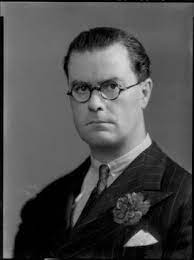
One eagle-eyed reader declared himself to be a fan of Macdonell’s comedic satire How Like An Angel but pointed out that the detective novels he wrote as ‘Neil Gordon’ (in collaboration with Milward Kennedy) and as ‘John Cameron’ were of ‘varied’ quality.
Another regular reader informed me that Macdonell was the driving force behind the formation of The Sherlock Holmes Society in its first incarnation in 1934 and became its Hon. Secretary. The Society reformed after WWII as The Sherlock Holmes Society of London and I was delighted to learn that Catherine Cooke, that eminent librarian and loyal supporter of crime fiction, has recently been elected its chairman. Clearly she has been forgiven for her minor lapse in judgement many years ago when she asked me to participate (and publicly display my ignorance) in a panel discussion on Sherlock Holmes.
On a different subject entirely, prompted by my review of Widowland, set in a Nazi-occupied Britain in the 1950s, another reader informs me of a piece of ‘alternate history’ where the Nazis won the war.
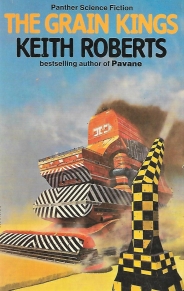
Until now I was unaware of Keith Roberts’ short story Weihnachtsabend, which is in the science-fiction collection The Grain Kings, published in 1976 (and which features an English hero called Mainwaring!), although I was well-aware of the author’s classic alternative history Pavane.
I was grateful for the tip-off and quickly purchased a paperback edition thanks to the jolly old interweb. It now sits on a shelf next to possibly the earliest example of this fascinating sub-genre I, James Blunt by H.V. Morton, which was published in 1942 whilst the war was still raging.
State Security
Over the course of the last 15 months I have received hundreds of emails from publishers offering me advance proofs of new books, which are much appreciated, but what rankles is that every time I am asked for my ‘best address’ even from publishers I have dealt with for more than thirty years and indeed two who used to publish me - and still pay me meagre royalties.
When I eventually queried the necessity to supply a postal address yet again, I was informed that publicity departments were no longer allowed to keep address lists of contacts following the new ‘GDPR’ regulations.
Whilst slightly confused as to why the defunct East German security service was now making such regulations, I realised that I must be breaking the law and possibly endangering the security of the realm, because I have maintained just such a list in alphabetical order for many years, regularly updating it. I call it my Address Book and it has been brought to my attention that such items, even if illegal under a tyrannical GDPR regime, are readily available from branches of W.H. Smith.
No Competition
Last month’s attempts at a competition were, frankly, a fiasco. Not a single entry correctly matched the dedications to the authors and so I was forced to drink the prize myself.
Several masochists have, however, demanded to know the answers, which were:
1) I’m philosophical about knowing you... [Philip Kerr]; 2) To Mike [Insert suitable inscription here, possibly including a pun on the word ‘Angel’]. Cheers! [Ian Rankin]; 3) For Mike - my mentor & guide... [Len Deighton]; 4) For Mike - Our late friendship together is a great joy to me! [Colin Dexter]; 5) To Mike: the only man who makes me laugh more than I do ! [Val McDermid]; 6) From one bullshitter to another with love... [Michael Dibdin].
However, my disappointment was quickly dispelled and my vanity boosted when I spotted a recent review on Amazon (with the obligatory five stars) of Mr Campion’s Coven [Severn House].
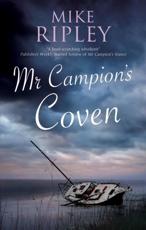
Penned by a verified purchaser called Greg Borgartz, the review begins:
Ever since I met Mike at a Book Festival in Essex I have been a fan of his books! He was warm, smart and funny and his books are too!
Sadly, I have no ‘best address’ for the eloquent Mr Borgartz otherwise the cheque, as we used to say, would be in the post.
Turned to the Dark Side
It was very remiss of me when introducing the erudite Mr Peter Guttridge as the guest speaker at this year’s AGM of the Margery Allingham Society, that I forgot to mention that he had a new novel out.

It could have been the fact that the meeting was held over ‘Zoom’, or more likely that for legal reasons, I was unaware of his latest book. Ironically, in my introduction, I did mention that Peter had started has a writer of comedy crime, but had in recent years ‘turned to the dark side’ with crime novels set in the Brighton area and Butcher’s Wood [Severn House] turns out to be the eighth title in what was originally billed as his ‘Brighton Trilogy’.
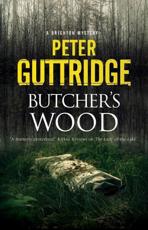
Even though it opens with a classic ‘golden age’ death of an actress on stage in the middle of a play, this is not a particularly cosy crime mystery to be investigated by Detective Inspector Sarah Hilary and her sergeant, the wonderfully deadpan Bellamy Heap. The Sussex countryside they patrol has a history of crimes past and present, ranging from murder to the hidden proceeds of a major robbery, extortion, a missing theatre director and the new kids (literally) on the criminal block in the shape of County Lines drug peddlers.
Peter Guttridge shows a fluent talent for the dark side of crime fiction whilst slipping in some delicious asides about acting and fading Hollywood star Nimue Grace, one of his regular characters, is one of his finest creations.
What’s in a Title?
There is no copyright or statute of limitations on titles, and publishers usually make strenuous efforts to avoid duplication - at least until a decent number of years have passed.
To give a personal example, an early novel of mine, provisionally titled Angel Eyeswas re-titled Angel Confidential when my publisher realised that, the same year, they were publishing Angel Eyes by Eric Van Lustbader, which I did not mind at all, though I would have liked a percentage of his sales.
This year Steve Cavanagh’s new legal thriller is The Devil’s Advocate but Steve is far too young to remember Morris West’s 1959 novel of the same title. Back in 1976, Colin Dexter’s Inspector Morse novel Last Seen Wearing shared the same title as a rather famous 1952 American crime novel by Hilary Waugh, although Colin said he was unaware of the book at the time his was published, and anyone who knew Colin believed him implicitly, though it was odd that his publisher did not flag up the matter. Perhaps it really doesn’t matter at all.
Certainly one cannot blame Vaseem Khan for choosing the title The Dying Day for his new novel (see Books of the Month) as he was annoyingly too young to have been influenced by James Mitchell’s Dying Day from 1988, the third crime novel to feature Anglo-Italian private eye Tommaso Ronald Hogget.
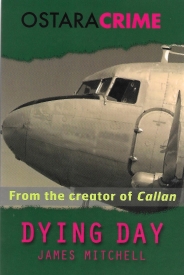
To be fair, Hogget was the least well-known (though the most amusing) of the three fictional heroes created by Mitchell in his thrillers. At one point tipped as the natural successor to James Bond following the death of Ian Fleming, Mitchell’s hard-as-nails secret agent John Craig had quite a following in the 1960s - and is still remembered today in America - but by far Mitchell’s most famous creation, in novels, short stories and on television, was the downbeat spy David Callan.
Bath Time
Peter Lovesey’s new novel Diamond and the Eye [Sphere] features his series policeman Detective Superintendent Peter Diamond on his familiar patch, the World Heritage city of Bath, though sometimes in parts the tour buses don’t get to. That news alone will delight fans of both Peters, but it is also an example of what Catherine Aird would call ‘a crime writer having fun’ by referencing other crime writers.
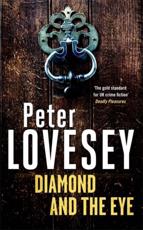
The ‘Eye’ of the title is a private eye, Johnny Getz, who seems determined to be a pain in Diamond’s nether regions and who has a collection of crime novels by authors whose names sound as if they fit the violent or criminal content of their books. Now I am happy to accept Slaughter, Gash, Cain, Gores, Nabb, Robb and even Cleeves at a pinch, but Grimes and Fowler? And clearly Lovesey is far too friendly a moniker to be in such company.
Peter - Lovesey rather than Diamond - goes one step further and involved real crime writers in his research for the novel, as he reveals in an Afterword.
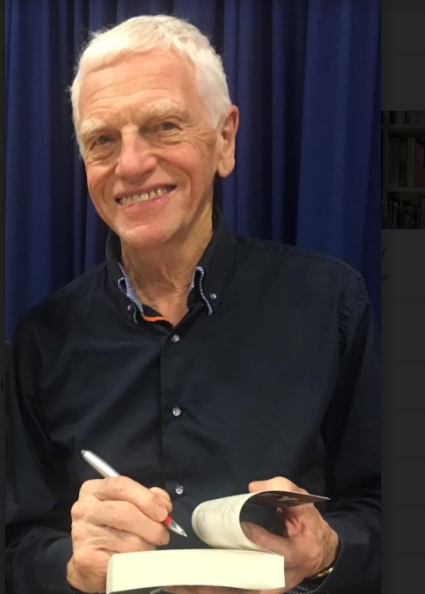
Having asked his friends, Bath residents Liza Cody and Michael Z. Lewin to recce and photograph a particular location (quite a posh, private one) with a view to helping his plot, the pair were spotted behaving suspiciously and then shadowed by a patrolling police car, and the incident found its way into book in Chapter 19.
As no legal action followed, Peter is able to claim that no crime writers were hurt during the writing of the novel.
Periscope Depth
There was a time, back in the last century when it seemed that every other British thriller took place on or involved a submarine.
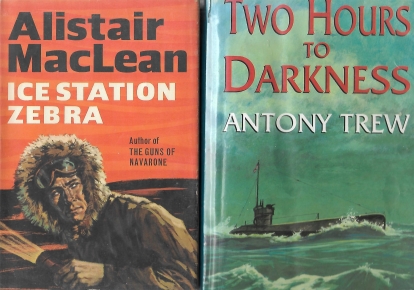
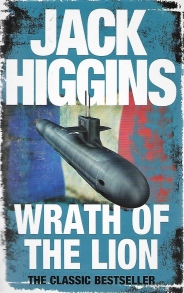 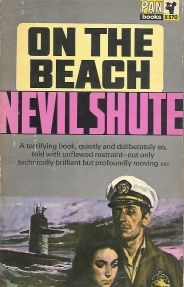
Long before the hunt started for Red October, submarines of all types from wrecked U-boats to re-commissioned U-boats to nuclear, featured in popular thrillers by Len Deighton, Stephen Coulter, John Blackburn, Antony Trew, Jack Higgins (in 1964, when he was still Harry Patterson), Desmond Cory, Geoffrey Jenkins and Alistair MacLean.
The groundwork for the popularity of submarines in thrillers had been laid in the 1950s with a flotilla of non-fiction books and films about the heroic exploits of Royal Navy submariners and frogmen and then Nevil Shute’s wonderful end-of-the-world novel On the Beach in 1957. Ironically, one of the great thriller writers of the period, Lionel Davidson, who served in submarines throughout World War II, never set a novel on board one.
All of which is a long-winded way of saying that I am looking forward to reading Red Traitor [Bantam] by Owen Matthews, having much enjoyed his previous thriller Black Sun.
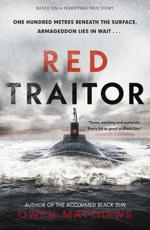
Set in 1962, the Red Traitor in question is a possible mole - in the Kremlin this time - being hunted by KGB officer Alexander Vasin. Meanwhile ... off Cuba, where the missile crisis with the USA is coming to a head, four Soviet submarines are engaged in a secret covert mission. Supposedly based on real incidents, I am sure Red Traitor will be as gripping as the frighteningly authentic Black Sun, as Owen Matthews, an experienced foreign correspondent and Russian expert, clearly knows his Soviet stuff - submarines included.
|
|
Books of the Month
Graham Hurley’s outstanding World War II thrillers used to be known as the “Wars Within” series, but has been re-branded (on the whim of a publisher I suspect) as the “Spoils of War” series, and the sixth and the latest is Kyiv [Head of Zeus], which is not a typo, but the authentic spelling for the city of Kiev in the Ukraine.
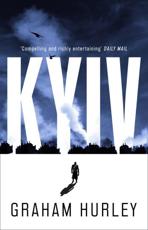
“Wars Within”, in my not-so-humble opinion, was a far better title for the series as each novel deals with an internal conflict within either the Allies or the various arms of the Nazi state and military. The novels stand alone, each based on a real wartime incident or setting but the main characters change. They may be rebellious Luftwaffe heroes, reluctant MI5 officers, disenchanted journalists working for Goebbels’ propaganda ministry or a doomed British female communist spying for the NKVD in Berlin, interspersed with real historical figures, most notably in Kyiv, Kim Philby.
The series does not stick to a firm chronology. For instance, [SPOILER ALERT] to find out what happens to the sadistic SS villain in Kyiv, you’ll have to read Last Flight To Stalingrad, which is set two years later but was published last year.
If you are unaware of what happened in Kiev after the Nazi invasion of Russia in 1941, Kyiv may be an eye-opener. To anyone not yet familiar with Hurley’s superb wartime thrillers, it certainly will. Graham Hurley - already a respected crime writer with some thirty titles under his belt - has established himself in the pantheon of thriller writers who have set novels in and around WWII and his books sit comfortably alongside those of Philip Kerr, Ben Pastor, John Lawton, Alan Furst and David Downing.

If you were not already paranoid about the influence of gigantic tech corporations, you will be after reading Peter Hanington’s chilling conspiracy thriller A Cursed Place [Two Roads], which could be science-fiction, except we all know it’s not.
The hi-tech company Public Square is based in Silicon Valley but its tentacles spread, with frightening speed, across the globe, from the mining of vital minerals in Chile to pro-democracy protests in Hong Kong, to the inner workings of the BBC, for what Public Square does best is collect personal information: lots of it, No internet search, Face Book entry or mobile phone call anywhere escapes their notice and if anyone rebels or attempts to free themselves from their grip, they have their own private army of ‘repairmen’ to solve the problem with violence.
Pitted against this implacable enemy are a young, female Chilean trades unionist, some Hong Kong students and a coalition of BBC foreign correspondents and researchers, headed by veteran reporter Will Carver, hardly the most tech-savvy of people, but a dogged news hack of the old school whose instincts for hunting the big story are as keen as ever.
Carver is a marvellous creation, just the sort of tough-as-old-boots hero we need in a world run by algorithms, computers mining personal data for sale to the highest bidder and the faceless (or false-faced) corporations trying to control us - by which, of course, I mean the tech giants, not the BBC. Just because you’re paranoid doesn’t mean they’re not listening in, or logging what you are reading at this very moment. If I knew how to, I would remove the SIM card (whatever that is) from my Nokia pay-as-you-go and destroy it in one fluid movement as I’ve seen Jason Bourne do many a time.
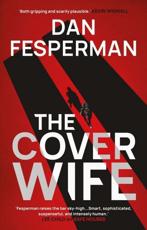
The Cover Wife [Head of Zeus] is another example of superior spy-fiction from Dan Fesperman who, writing at the top of his game, makes the modern day shadow war against Islamic jihadis all too plausible.
The setting is Hamburg, in 1999 and rival two American and possibly a German, intelligence operations overlap and old rivalries surface with disastrous results as they attempt to infiltrate a jihadist cell, relying not on high-tech surveillance but on good old fashioned leg-work and tradecraft, which means human interaction with the enemy, and that is always the weak spot of any spying mission.
The ‘Cover Wife’ herself is a CIA agent posing as the wife of an American academic on a book tour of Europe, the book in question being guaranteed to generate Islamic anger, but her role turns out to be far more complicated than that of a mere bodyguard (though she’s pretty good at that). As the various missions collide and collapse, you know it’s not going to end well and the final ‘reveal’ - although you can see it coming - is still shocking.
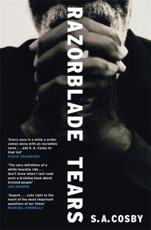
I thought Shawn Cosby’s Blacktop Wasteland was outstanding, my fiction “find” of last year and I remember experiencing the same frisson of excitement I had when I first read novels by Elmore Leonard and Charles Willeford. Cosby’s new novel Razor Blade Tears [Headline] is even better, but definitely not for the faint-hearted.
This is American blue-collar noir set in a rural Virginia steeped in historical prejudices and some relatively modern ones. When a young married gay couple of mixed race are brutally shot to death, seemingly for no reason, their working-class fathers who have up to now ignored or rejected their sons’ sexuality, set out to seek an explanation, possibly justice and most certainly revenge. In the course of their short and bloody odyssey - very bloody by the end - they are threatened by an entire chapter of Hells Angels, distrusted by the LGBTQ+ community and manipulated by the rich and powerful politician behind it all.
With the forces of law and order kept at arm’s length, the two dads (one white, one black, both with criminal records though now trying to go straight) go to war with only minimal resources at their disposal. It is amazing, though, just how much damage you can cause with the tools of a landscape gardener.
Razor Blade Tears confirms that Shawn Cosby is a new and important voice in crime fiction and a writer who can not only do suspense and violent action, but has real, sympathetic, characters liable to drown in their emotional whirlpools. (Even one of the vicious biker baddies is allowed a flash of humanity, though it doesn’t do him any good).

When a successful ‘literary’ novelist after three cult bestsellers gives up fame, fortune and literature to live on a tiny remote island off the southern coast of France (tiny and remote, but it has restaurants and a bookshop, so can’t be that bad), you know that the title of Guillaume Musso’s novel The Secret Life of Writers [Weidenfeld] is more than a vague hint as to what is going on.
After twenty years of self-imposed exile (and silence), famous author Nathan Fawles finds his island refuge invaded by a fan and would-be author seeking Fawles’ blessing on his manuscript, and also a mysterious female Swiss journalist wanting not Fawle’s story, but to tell him one. And then a body is found, nailed to a tree and things get really bizarre. Being a story about stories (and very convoluted back-stories), there are multiple literary references, many of which are well above my pay grade, but much of the book has the air of a Simenon novel, where nothing happens but actually everything does.
The solution to the various mysteries of our writer’s life comes in a Christie-like multi-threaded exposition in a barely credible finale and the moral of the tale is best illustrated in the quote attributed here to Margaret Attwood: wanting to meet an author because you like their books is like wanting to meet a duck because you like pâté.

When I recommended one of James Carlos Blake’s earlier novels about the Wolfe clan, I received formal letter of thanks from a reader for helping him ‘discover’ the author. The latest book in the saga is The Bones of Wolfe [No Exit] and continues the seemingly unstoppable rise to power of the two branches of the Wolfe family divided by the Texas-Mexico border but united in their business empires, legal and illegal, and family loyalties.
I can’t think of anyone writing ‘border noir’ like James Carlos Blake, though James Crumley famously have a go with Bordersnakes twenty-five years ago, and his brash, violent style will not be to everyone’s taste partly because most of the excitement is generated by the activities of the extended family’s ‘shade trade’ - i.e. the illegal bits. The Wolfes have no time for governments or law and order, apart from the Second Amendment which give them the right to bear, and use, arms. Cross-border smuggling is their main trade and, of course, they steer clear of the drugs traffic, presumably on moral grounds, although have no qualms whatsoever in selling machine guns to Mexican drug cartels.
In places the story is highly romanticised but told with such passion and clear affection for the locale that the reader can easily forget these guys are not the free-spirited Robin Hood outlaws they think they are.
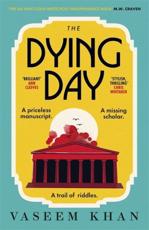
When a 600-year-old copy of Dante’s Divine Comedy goes missing from a museum and a trail of clues left in the form of verse riddles, it seems like a job for Dan Brown’s symbology professor. Thank God it isn’t, because the museum in question is in Bombay, the year is 1950, and in The Dying Day [Hodder] Vaseem Khan reintroduces the marvellous Persis Wadia, the newly-independent India’s first (actually only) female police detective.
Based in Malabar House, an almost defunct police station where it is hoped she will be forgotten or at least kept out of the way, Persis is on hand to field the case of the missing million-dollar manuscript (which Mussolini had once tried to buy) and the missing British academic curating it. Before she has time to solve any of the riddles which might lead to the Dante, though, she has to attend the particularly gruesome death of a young white girl found across local railway lines.
Such problems are no more than trifles for Persis compared to the underlying one that she expected to work with officers who despised her because she was a woman. But don’t worry, Persis can handle herself and as this charming series continues, readers will be cheering her successes. Vaseem Khan’s books are not only affectionate portraits of India, but educational about its history and culture. I, for instance, learned the word agiary, which is bound to come in useful one day and I was delighted to discover that the Governor of Bombay who really did gift a copy of The Divine Comedy to the Asiatic Society of Bombay in the 19thcentury, was the splendidly named Mountstuart Elphinstone.
Spy-Fi Catch Up
I have logged 89 new crime/thriller titles published in the UK in July, which is almost three a day and my database is by no means complete due to being blacklisted or ignored by several publishers, so the actual total could be well over a hundred. In the same month last year I recorded 56 new titles and I do not count self-published or eBook-only publications.
The increase in new titles may be good for crime fiction, but they make the job of the reviewer - or ‘influencer’ as I have been labelled - more exhausting and there are several titles on the espionage spectrum which I simply have not got around to yet, so I will have to beg forgiveness for the most cursory of mentions.

Set on the South Atlantic island of the same name, Ascension [Little Brown] is Oliver Harris’ second outing for his reluctant MI6 hero Elliot Kane, who discovers that Ascension is not just a desolate volcanic remnant of Britain’s imperial past, but now a strategically vital part of cyber security, being a hub for trans- South Atlantic fibre cables. I am ashamed to say that although he began writing crime novels ten years ago, I had not come across Oliver Harris until now, but he does come highly recommended, by Ian Rankin among others.

Probably the best-known fictional spy who is also an art restorer, is Gabriel Allon as created by Daniel Silva. Allon’s latest mission, which ranges from Washington to Moscow Centre via London and the shady side of Switzerland is The Cellist [HarperCollins].
Carving her own niche in the hybrid field of domestic suspense and spy fiction is Charlotte Philby, grand-daughter of double-agent Kim, although she herself admits ‘they are not traditional spy stories’. Her take on a world of deceit and suspicion through a female lens is on show in The Second Woman [Borough Press].

The Price is Finally Right
On a personal note, the easing of Covid restrictions allowed me to travel to London (on a sealed train) to fulfil a promise made some 15 months, which was to have lunch with James Price, son of the esteemed reviewer of crime writing and spy-fi supremo, the late Anthony Price (1928-2019).

The table talk ranged widely though always returned to crime fiction and the outstanding spy thrillers of Anthony Price, with James recalling how he had driven his father on research trips to the Teutoburg Forest on the Rhine (A New Kind of War) and in the southern states of the USA (Sion Crossing). I also renewed a promise that I would eventually get around to arranging publication of a lecture given by Anthony at the New York Public Library in the 1990s where he discussed the British attitude to spies and spying displaying - as you would expect - his impressive grasp of history.
Don’t worry, the end is in sight...
Pip! Pip!
The Ripster
|